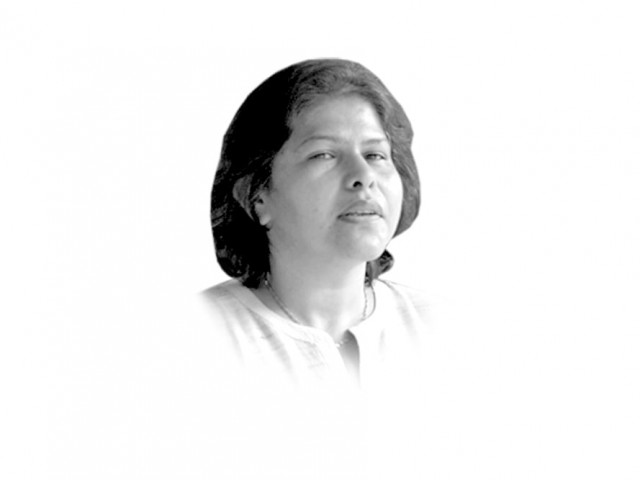Sorry Gaza, can’t help
In the tragedy of the dying children of Gaza, lies the inner tragedy of our divided and disempowered societies.

Sorry Gaza, can’t help
But for all these condemnations and holier than thou attitudes, one wonders where are the real political protests in the Muslim world and the Third World at large? There were reports of hundreds of people protesting in Jordan. Just hundreds? This is something on which thousands ought to have come out. Other places are even worse. I haven’t heard anything happening in Saudi Arabia or a large part of the Muslim world. Even in Pakistan, where we have been passionate about Palestine for a long time, there are no noticeable protests.
Perhaps, there are three reasons for such apathy. First, most of these societies have become apolitical. The depoliticisation of society and politics means that we will shed some tears but not raise a loud voice because we do not believe in political protests. For the average person, what use is a street protest? Second, once upon a time, those from the political Left or those who were considered liberal would feel passionately about Palestine and similar issues. Of course, some small groups still come out on the streets but there is little passion around the movement. This is because the average citizen is divided between taking a clear principled stance on the use of force by the state. Condemning Israel is one, but then there is the fear of such condemnation expanding to one’s own state, which may be engaged in atrocities internally. Gaza is tragic but it also resembles Balochistan, Kashmir, the tribal areas, the Kurds in Iraq and Turkey and many other places. The states are satisfied at one level that the news of Gaza has completely diverted attention from local battlegrounds. When a state and its military kills poor peasants to establish control of a land or when people are picked up and made to disappear, the acts are equally heinous and condemnable. However, the problem is that within our own environment, our thinking is driven by the state’s definition of war and terror.
Third, the years of war on terror have totally changed political dynamics of protest. The peoples of a land have a right to protest against the state if it is seen as dispossessing them of their rights. The state emerges from and represents a social contract, which can be rightfully challenged as we witnessed in the case of Quebec and Scotland. However, states that see political protests as a threat tend to use force. Some states like Israel do not even want to engage a certain population in dialogue or include it in a social contract thus resulting in violence. Sadly, the world has begun to see protest mainly through the lens of violence and religion. The earlier Palestinian intifada had an inspirational value for others in similar conditions around the world. The ripple effect had a problem that countries, which earlier sympathised with the Palestinian issue, began to see it as something that connected with violence in their own states. India, for example, was once a supporter of the Palestinian cause; its government did not even censure Israel for the latest round of atrocities. For New Delhi, the issue is how can it condemn Tel Aviv that has supported India in beefing up its military and technological strength to fight terror. The Indian leadership may no longer look at Palestine as a secular political and human rights issue but a problem of militant political Islam.
In fact, this is where depoliticisation of civil societies around the world, especially the Islamic world, has turned into a bothersome problem. I once remember a conversation with a renowned Pakistani academic currently engaged in think tank activity, who, while discussing Afghanistan, blurted out that it were only the Taliban that could fight American imperialism. There are many who are selectively uncomfortable with the fate of oppressed people in other parts of the world but secretly comfortable with outsourcing the act of opposing such state-led atrocities to non-state actors. We have certainly lost the capacity for political protestation and doing things short of violence. I remember an incident from seven to eight years ago when some of us were protesting in Islamabad and advocating boycott of American goods. We tried hard to convince a maulana sahib trooping into one of the American fast food joints with his children. He looked at us, pointed at his belly and his children and walked away into the eatery. Others opined how we could protest American atrocity while wearing Western clothes. As if political protest has a religion or a dress code. An apolitical society and its conspicuous consumption-driven middle class and elite may not find the strength to save the children of Gaza.
The fact is that the trader-merchant class in a lot of Muslim countries finance militant outfits that eases their guilt for not doing anything themselves. Let’s pay for militants rather then launch a political protest. But why can’t Israel feel the heat of public condemnation, just like Turkey has done? In the tragedy of the dying children of Gaza, lies the inner tragedy of our divided and disempowered societies.
Published in The Express Tribune, July 24th, 2014.
Like Opinion & Editorial on Facebook, follow @ETOpEd on Twitter to receive all updates on all our daily pieces.














COMMENTS
Comments are moderated and generally will be posted if they are on-topic and not abusive.
For more information, please see our Comments FAQ